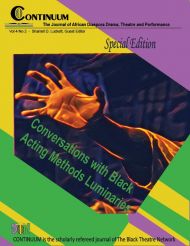Barbecue by Robert O’Hara
Directed by Coleman Domingo
Geffen Theatre, Los Angeles
13 September 2016
Playwright Robert O’ Hara has dealt with themes of secrecy, family, race and gender since his startling acclaimed early work, Insurrection: Holding History (1997). His newest play, Barbecue, continues an exploration of these themes, adding a great dollop of irony to the fate of these characters in a funny and often audacious domestic comedy. In this play, O’Hara confronts two pervasive themes in contemporary American culture: exploitation and authenticity. Being the clever and provocative playwright that he is, O’Hara delivers, for the most part, a piercing look into how our contemporary media culture is dominated by the “reality show,” where episodes of human frailties are exploited for the sake of fame and fortune. O’Hara uses the substance abuse intervention as a mirror that reflects our society’s all consuming penchant for the tabloid presentation. While a comedic tone dominates, Barbecue’s underlying seriousness is revealed through its characters’ attitudes toward their own dysfunctional issues in relation to gender, race and class. O’Hara mixes these familiar themes with theatrical verve, resulting in a play that leans toward an entertainment piece without the stringent commentary associated with O’Hara’s earlier work.
In an interview included in the program notes, O’Hara explains that the idea for the play came from his watching a television show called “Interventions”. He says that he observed mostly non-middle class whites as subjects but rarely people of color of any class, leaving him to wonder whose story gets told and by whom? His satirical take on contemporary American mores utilizing the issue of the intervention, which was popularized in late 80s as a way to deal with a loved one’s addiction problems, poses an ethical question: Can we redeem ourselves without being honest? Using this premise, the play explores addiction, class and money. The barbecue acts as metaphor for the quintessential American family gathering where fun and relaxation is the primary draw. However, in O’Hara’s hands the happy family gathering collapses into a melee. Individual family member’s secrets are ruthlessly uncovered by the siblings as they await the arrival of their sister, Barbara, the real object of the intervention. The actors perform with gleeful abandon as they rip into each other’s foibles while the audience witnesses the fissures within the dysfunctional family as a model for the wider American society that more often than not supports greed and surface probity.
Barbecue is set mainly in a park landscape with picnic tables, benches, and a slide. Human nature is played out in the unremitting space of Mother Nature. Into this sylvan setting comes a white family--siblings who might commonly be called white trash--talking, talking, talking about the pending intervention of their notorious sister, Barbara, also known as “Zippity Boom”. When the lights come up on the second scene, the white actors have been replaced by black actors in the same costumes assuming the same roles. It is a wonderful theatrical sleight of hand, eliciting (at least from my audience) sustained laughter and applause. The first act is the teeter- totter that swings between the white and black characters, giving the audience more back story and revealing the distinct character defects from each family. By the end of the act we realize that the black family is being filmed as the counterparts of the real white family. O’Hara has accomplished an element of surprise that shock the sensibilities of his audience through a wonderful theatricality that does not return in the latter half of the play.
Act II brings the two Barbaras together on the park landscape. The long scene promises more revealed secrets and does not disappoint. Black Barbara, a well known entertainer, has bought the white Barbara’s memoirs of recovery from addiction to produce a film (called “Barbecue”) for her own self-aggrandizement. As it turns out, Barbara’s memoirs are faked. Celebrity Barbara’s abuse problems as well as her lesbianism have been covered up by publicists. Ironies of ironies abound as the two collude to conceal the truth for selfish reasons (more money for the white Barbara and an Oscar grab for the black Barbara), thereby circumventing the actual intent of the intervention, which is to free them of their secrets. Ironically, the women have empowered themselves to tell their own story in the manner they deem fit.
If the second half of the play seems less satisfying than the clever and provocative first act, it is because the reality show based referent seems to have pervaded every aspect of American life to the extent of predictability. I applaud O’Hara for writing a play that seeks to question who gets “intervened”? Having the women agree to deceive the public certainly illustrates agency, but eludes the actual intent, which is honesty emerging from a deeper examination of the self. Black Barbara’s “Zippity Boom” merges with her celebrity personality in a kind of makeover that is familiar in our celebrity driven culture. White Barbara will give her family “hush” money to maintain the fictional account of their lives. Granted, the conversation between the Barbaras is confessional, but only between the two of them. Their secrets will remain a covenant in exchange for money. Tellingly, the open space of Act I abruptly transforms into the confined space of an Oscar telecast by the end of Act II with both families brought on stage in the glare of bright lights to thank each other for telling their stories so “truthfully”. It is amusing and discomfiting at the same time.
Even though O’Hara’s evolution as a playwright retains its power in the interrogation of secrets and lies Barbecue could be considered a way station for the gifted playwright while on his way to weightier subjects. Insurrection: Holding History was twenty years ago and playwrights should be allowed to try their hand at many genres of drama. As it is, the play entertains and while doing so manages to hold the mirror up to our tabloid culture, asking the audience to consider what kind of society do we want: exploitation or authenticity?
Tony Fitzgerald
University of California, Los Angeles


